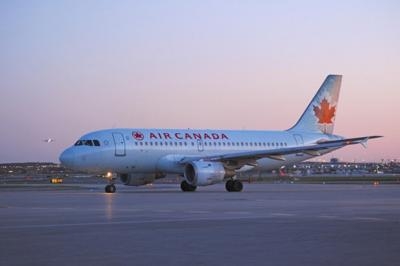Tue, Jun 19, 2012
Says There Is The Potential To Reduce CO2 Emissions By More Than 40 Percent
Airbus and Air Canada on Monday made what they billed as North America’s first “Perfect Flight” over international borders, with the goal of cutting CO2 emissions by more than 40 percent compared to a regular flight. The commercial flight on an Airbus A319 aircraft from Toronto, Canada to Mexico City combined the use a modern, state-of-the-art aircraft, powered by sustainable alternative fuels, guided by streamlined Air Traffic Management procedures and facilitated through best practice operations to under-pin the industry’s four pillar strategy to tackle carbon emissions.

The Air Canada flight (AC991) is the second leg out of a series of four biofuel flights taking the Secretary General of the International Civil Aviation Organization (ICAO) Raymond Benjamin to Rio de Janeiro for the United Nations Conference on Sustainable Development (Rio+20).
The flight combines best operational and environmental practices available today. Dubbed as "Perfect Flight", it includes:
- Operation of the most eco-efficient aircraft family in its market segment.
- Use of sustainable bio-fuel blend (a 50 percent blend) made from used cooking oil supplied by SkyNRG.
- Optimized routings and flight altitude. In agreement with the Air Traffic Management authorities, the Airbus A319 will fly the most direct route, using the most efficient vertical flight profile and applying a Continuous Descent Approach (CDA) into Mexico City to save fuel and limit noise.
- Combination of several eco-efficient operational procedures such as single engine-taxiing, external aircraft cleaning for improved aerodynamics, light weight cabin equipment and a neatly tailored flight plan
"Today’s flight with Air Canada proves that the aviation industry is in a strong position to reduce emissions and fly many more Perfect Flights," said Fabrice Brégier, Airbus President and CEO. "To make this a day-to-day commercial reality, it requires now a political will to foster incentives to scale up the use of sustainable biofuels and accelerate modernization of the air-traffic-management system. We need a clear endorsement by governments and all aviation stakeholders to venture beyond today’s limitations."
"Air Canada fully accepts its responsibility to reduce its footprint and our first flight using biofuel tangibly demonstrates our ongoing commitment to the environment. Since 1990 our airline has become 30 per cent more fuel efficient and we are determined to increase these gains through cutting-edge measures such as those being showcased with this Airbus A319 Toronto-Mexico City flight, our greenest ever," said Duncan Dee, Executive Vice President and Chief Operating Officer at Air Canada. (Image provided by Airbus)
More News
He Attempted To Restart The Engine Three Times. On The Third Restart Attempt, He Noticed That Flames Were Coming Out From The Right Wing Near The Fuel Cap Analysis: The pilot repor>[...]
Make Sure You NEVER Miss A New Story From Aero-News Network Do you ever feel like you never see posts from a certain person or page on Facebook or Instagram? Here’s how you c>[...]
From 2009 (YouTube Edition): Leading Air Show Performers Give Their Best Advice for Newcomers On December 6th through December 9th, the Paris Las Vegas Hotel hosted over 1,500 air >[...]
Aero Linx: NASA ASRS ASRS captures confidential reports, analyzes the resulting aviation safety data, and disseminates vital information to the aviation community. The ASRS is an i>[...]
“For our inaugural Pylon Racing Seminar in Roswell, we were thrilled to certify 60 pilots across our six closed-course pylon race classes. Not only did this year’s PRS >[...]
 NTSB Final Report: Rutan Long-EZ
NTSB Final Report: Rutan Long-EZ ANN FAQ: Turn On Post Notifications
ANN FAQ: Turn On Post Notifications Classic Aero-TV: ICAS Perspectives - Advice for New Air Show Performers
Classic Aero-TV: ICAS Perspectives - Advice for New Air Show Performers ANN's Daily Aero-Linx (06.28.25)
ANN's Daily Aero-Linx (06.28.25) Aero-News: Quote of the Day (06.28.25)
Aero-News: Quote of the Day (06.28.25)



